- Hey Dullblog Online Housekeeping Note - May 6, 2022
- Beatles in the 1970s: Melting and Crying - April 13, 2022
- The Beatles, “Let It Be,” and “Get Back”: “Trying to Deceive”? - October 22, 2021
Michael G’s post “Let It Be, Get Back, and History as Art” and the comments on the site have raised so many interesting points about Lindsay-Hogg’s 1969 film and Peter Jackson’s forthcoming one that I wanted to say a bit more about why I’m looking forward to Jackson’s film, but also not expecting it to be the whole truth. A lot of that expectation derives from considering historical context, so let’s get into the wayback machine for a minute.
In 1975, Barclay James Harvest released the song “Titles,” taken from their album “Time Honoured Ghosts.” The vast majority of the song does consist of titles–specifically, the titles of Beatles songs. I suggest listening to the song before reading the rest of this post:
I bring up this song now as a reminder that in the late 1960’s and the 1970s there was both a yearning for the Beatles to reunite and something of a backlash against them. “Titles” is an important reminder of one of the reasons for that backlash. (For another example of backlash, see this HD post I wrote about Lester Bangs’ 1975 takedown of the Beatles).
I think the key lyrics in the Barclay James Harvest song are the repeated lines “Were you trying to deceive / Telling me / All you need is love . . . to succeed?” That sentiment encapsulates a fairly common sense, in the 1970s, that the Beatles were a group of hippie optimists whose overly sunny view of the world had been proven false by Altamont, the Charles Manson murders, and the Watergate scandal, among other events. Barclay James Harvest delivers the lines more in mourning than in anger: in the song, they sound like a genuine question, rather than an indictment. “Were you intentionally or accidentally deceiving us?” seems like a fair paraphrase. But note that either way, the fact of deception is not questioned.
I link this sentiment to the atmosphere that Michael G. has so cogently described as surrounding the release of the Let It Be film in 1970. There’s a sense of being hungover from the 1960s, and of embracing a kind of wised-up cynicism. I see Michael Lindsay-Hogg’s film as both being shaped by this atmosphere and as contributing to it. Let It Be unquestionably distills realities about this period of the Beatles as a group: they were fighting, the fractures were opening, the end was approaching. Any honest reckoning of the Beatles in the late 1960s / early 1970s must take all this into account.
At the same time, as I’ve said in previous comments on Let It Be / Get Back posts, I don’t see Hogg’s film as the entire truth. That the Beatles recorded Abbey Road after the period Hogg documents points to the complexity of the breakup and of the Beatles’ feelings about it. I find it unsurprising that interviews with Lennon, Harrison, and McCartney around the time that Let It Be was released often mirror the anger and toxicity highlighted in that film. In order for the four members to achieve escape velocity and break up the band, they needed a great deal of hostility as fuel. How deeply-rooted that hostility was, how long it lasted, and how the four former members felt about it in the years afterwards – now those are vexed questions.
That’s why I look forward to seeing the entirety of Jackson’s film and of setting it beside Let It Be. As I do, I want to take into consideration all the salient points that Michael G has made about its creation. Odds are that this version will overemphasize the sunny side and downplay the shadow elements. But both the sun and the shadow are there, and I think each is necessary to gain a better understanding of the Beatles as a phenomenon and as human beings.
In the end, we’ll all have to decide whether Lindsay-Hogg and/or Peter Jackson are deceiving us, wittingly or not. The one thing I’m certain of is that it’s impossible to tell a story like this without being influenced by the cultural pressures of the day.

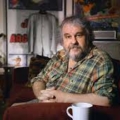
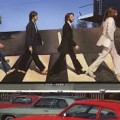
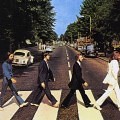
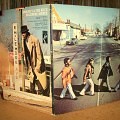
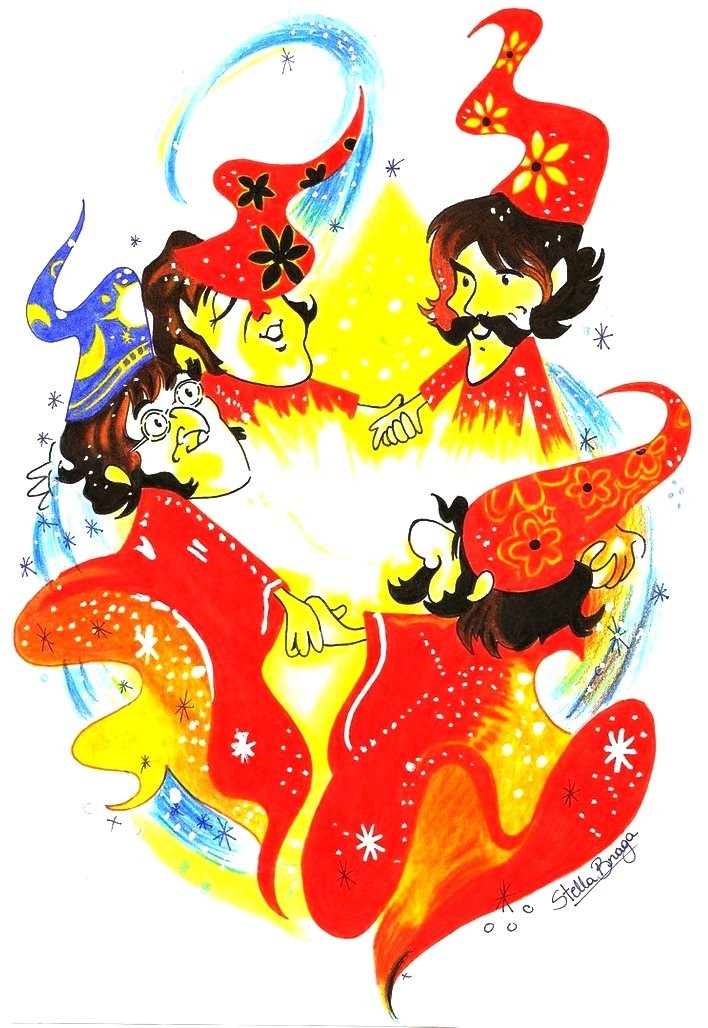
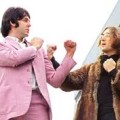
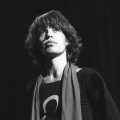
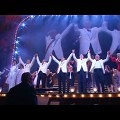

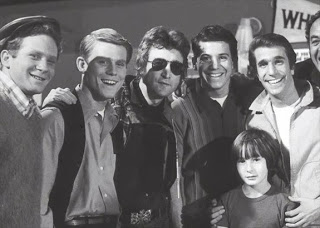
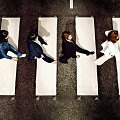
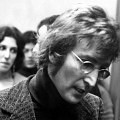
Great post, @Nancy — the one thing I’d add is that there’s an element of the religious in how the Beatles were perceived after Pepper. That’s what drove the backlash–“You told us x, and we believed you, and now look!”
That was thick, thick in the ten years between the breakup and Lennon’s death, a longing to see them back together (not least to help us make sense of how the world had changed since 1970), mixed with a sense of deflation that the dreams of the Sixties had not been, and would likely never be, fulfilled. This deflation was aimed at The Beatles, and as the glory of the actual band has faded, the deflation has largely remained.
Maybe from the beginning, but certainly since the high hippie days, and definitely since the breakup—and this is something Devin McKinney’s book is so so good on–The Beatles are most properly understood as a religious phenomenon.
“How deeply-rooted that hostility was, how long it lasted, and how the four former members felt about it in the years afterwards – now those are vexed questions.“
I’ve been reading “The Lyrics”, and under “Too Many People”, Paul says this: “I’d been able to accept Yoko in the studio, sitting on a blanket in front of my amp. I’d worked hard to come to terms with that. But then when we broke up and everyone was flailing around, John turned nasty. I don’t really understand why. Maybe because we grew up in Liverpool, where it was always good to get in the first punch of a fight.”
I know Paul says he and John had made peace when John died, but I don’t think they had the difficult conversations they needed to.
@Tasmin I think Paul was perfectly willing by 1980, if not years before, to put things right with John and repair that relationship. Most the problem was John, but it was also Yoko. As people like George Harrison and Pete Shotton have observed, they would catch glimpses of the old John, and then he would vanish in a puff of smoke again as soon as Yoko got in his ear. Or observe how in 1974, when he’s living with May and Yoko’s presence is diminished, he’s seeing his old friends again, he’s warming to Paul, he’s spending time with Julian. He goes back to The Dakota and all the work goes to waste. Now John had a tonnage of mental issues that included paranoia and jealously directed towards Paul, but without Yoko he seemed more willing to try and set those aside. Conversely, Yoko understood John’s paranoia and worked to feed and exacerbate it. Not only that, she was proactively blocking Paul’s calls during the Double Fantasy sessions, at a time when John appeared more receptive to connecting with Paul; not to mention having screened all his telephone calls at the Dakota for years; and not allowing him back to England even after the US green card. So a great part of the problem here is John&Yoko, and the fact that John&Yoko is completely toxic to a mentally healthy John who might have warm relations with the people he used to know. John&Yoko is mutually exclusive with John&Paul. I really think a John without Yoko would have been willing to make some sort of sustained peace with Paul. Sadly, that didn’t happen, and I don’t think John and Paul ever really resolved all that was between them. That’s what I get from the Hunter Davies interview, and from Paul’s rawer remarks in the 80s. And it’s definitely why Paul made an effort to put things right with George at the end, lest the same thing happen twice.
@Matt, at one point (ten years ago) I’d read everything there was to read about the Dakota Years, and I think your assessment is right on. For whatever reason, Yoko believed that it was her job to separate John from his past, and keep him separated from it — hence the samurai sword above his bed.
But the obvious question is: why did he, or they, feel he needed to do that? What reasons, other than Yoko’s wishes, did John have to shun his pre-Yoko life and the people in it? What was she protecting him from, and was that accurate? Or was that an excuse to control him? (“If you think Yoko controls me, brother” — well, I didn’t before you said that, John, but is there something you want to tell us? 🙂
Had Pete Shotton, David Bowie, Mick Jagger or any of the other screened-out individuals harmed John, emotionally, professionally or otherwise? How did Paul, the collaborator with whom he generated more success than anyone in the history of showbiz, genuinely harm him? Why, by 1977, was that friendship verboten, and Yoko screening his calls? Why was she speaking for him in business meetings in 1969? What was she trying to prevent, and by whom? If she was trying to “protect” her husband, where is the evidence of harm before she arrived? And did it stop after she arrived?
Within the cohort of rockstars of his generation, Lennon was not a particularly hard partier; he drank too much, but he was not a Keith Moon or Harry Nilsson even a Ringo Starr, men whose behavior predicted cirrhosis or worse. And more to the point, Lennon’s drug use didn’t end with Yoko–she didn’t get him “clean and sober.” She introduced him to heroin which is a much easier and quicker way to kill yourself than Lennon’s pre-Yoko drugs of choice. Yet even the term they used for Lennon’s time away from Yoko — “The Lost Weekend” — assumes that without her, he was doomed, miserable, an irredeemable addict, a danger to himself. They said it, a lot, but was it true? What’s more dangerous, “shooting as exercise” or getting thrown out of a bar with a Kotex on your forehead?
John wasn’t ruined or even seriously manipulated by Brian Epstein, and during Epstein’s tenure he made his fortune. Brian’s business failings aside, he didn’t screw The Beatles like Klein had Sam Cooke and The Stones; the Beatles owned their own masters, and publishing rights. In fact, the business people John associated with after Yoko — Klein, Morris Levy and David Geffen — are exactly the kind of sharpies he talks about in Lennon Remembers. They were much more dicey than Brian Epstein ever was.
Paul, though he could be overbearing, was clearly a great artistic partner for John, and John was highly functional during their working relationship. Apple was a mess, but the rip-offs were small and easily managed, and we know this because they were rectified in years, not decades, and all four Beatles died/will die rich and owning their material. The various post-1970 lawsuits between the Beatles and Allen Klein cost the Fabs much more money than the junkies stealing stereos from Savile Row. Like heroin, Allen Klein was a post-Yoko decision, and it was exactly what she claimed to be protecting him from.
When John and Yoko are speaking together (as in Lennon Remembers and then the 1980 spate of interviews) Lennon is consistently bitter about any part of his life that didn’t include Yoko, and pours scorn on basically any association (McCartney, Epstein, Martin) or even friendship other than Yoko, with the long-dead Stu being a notable exception. The entire time John is with Yoko, there is a perception that he couldn’t survive without Yoko, and while he did have his danger times — he did seem to drug too much in 1967, and drink too much in 1973/74, and I personally believe he was in crisis after India — it’s also never acknowledged that he was a grown-up man with a whole grown-up life before he met and married Yoko, and seemed to get through it with more success, and less mayhem, than many of his contemporaries.
In the so-called Lost Weekend there’s a lot of great work, and he seems no less happy with May than he was with Yoko before or after. And if we go by the photos and his absence from public life, it’s at least arguable that his behavior during the Dakota Years is as self-destructive as any in his life; being drunk in public with Harry Nilsson at The Troub is a bad look, sure, but during the period just before Double Fantasy, John looks emaciated and shockingly aged for a man in his late thirties. He’s skinny and drawn; his hair is thinning, which is often a sign of malnutrition. The doctors who examined him in 1980 were shocked at his condition. We can certainly say that in 1979 he looks much worse, physically, than he did in 1974, when he was supposedly living dangerously with all the bad influences. That’s a hell of a deterioration between age 34 and 39, especially given that he was supposedly “living healthier.”
So while the idea of John+Yoko=healthy and John-Yoko=dangerous isn’t really borne out by the data, he parrots it constantly. It was clearly tremendously important within John and Yoko’s marriage. Whenever they were together, there was a level of victimhood, paranoia, and barely repressed fury towards everyone outside them that you simply don’t see when John was not in that relationship. Some marriages are like that, they need external enemies, but the real tragedy is how it isolated John from his peers, including Paul, and didn’t allow him to have any meaningful adult friendships other than his spouse…because every relationship had to be approved BY his spouse. I do not think this was tenable, in the long term, and while being married to John Lennon was clearly good for Yoko’s career, profile, and health–she’s basically the same person in 1968 and 1980–being married to Yoko Ono was clearly NOT good for John’s career, profile, and health. “Everybody’s out to fuck you” John really only emerges after Yoko hits the scene, and pretty much whenever she’s with him, he’s that guy. And his professional work, after 1968, is quite a bit less accomplished, especially if you remove his postmortem success–DF, a fine album, only really reached the firmament after his murder made it all so incredibly heartbreaking.
I have said before that I think Yoko Ono probably saved John’s life in May 1968; but I think if we look at the next twelve years dispassionately–not as they want us to, or we might want to, but looking at what happened–I don’t think she was very good for him. I think, rather, that there was a specific sexual need that they fulfilled for each other, and while feeding that craving may have felt like love, in the end I don’t think they were “one of History’s greatest love stories.” And, in my experience, truly happy couples don’t make statements like that. It’s just obvious they love each other.
[PLEASE NOTE: Replies to this comment should be substantive and factual. Replies that essentially repeat The Ballad without testing it will be deleted; I’m done arguing with “I just feel” responses on this site. Above, I’ve told you WHY I have the opinions I have; you should do the same. My opinions change with new data, and frankly I’d love it if someone could convince me the above is incorrect.]
Michael, excellent post, and I agree. The information I’ve come across recently, especially Joe Hagans biography of Jann Wenner, and Mikal Gilmore’s piece on the breakup in Rolling Stone, confirm what you wrote.
It’s too bad that in order for Anthology to happen, and any subsequent Beatle projects, Yoko had to agree. I think the business aspect is ultimately why Paul forgave her. (Even though George told him it wasn’t healthy to hold onto all that negativity.)
Sean Lennon is running the estate now and has been for a while as Yoko has been in poor health.
What do you think of Yoko’s statement that she instigated their time apart during The Lost Weekend because she felt they were suffocating each other (a not unheard of problem with some couples). I don’t think John was being mind controlled. Some of it was just him.
@Michelle, I have NO DOUBT that John was a really really tough guy to be married to. He seems to have been very needy, was used to being the center of attention, had millions of sycophants at the ready, and had poor impulse control. I was just listening to an interview with Richard Pryor’s ex-wife and she was saying, “You marry someone like that, a troubadour, and you have to be OK with what that means.” So it makes perfect sense to me if Yoko instigated the time apart. I don’t know if she did, or that was them retconning, but it wouldn’t surprise me if she did. I’m amazed they hung in there until 1973.
To be frank, I think Yoko has been stifled to some degree by her association with Lennon–she hasn’t really grown or changed as an artist since the mid-60s. I have a lot of sympathy for her; her choice might’ve been “be your own person and continue to starve, or be married to this very difficult man (who loved her, but was still difficult) and live like a queen, but always be in his shadow.” I don’t know what she should’ve done, honestly. I do think that the culture was turning in her direction though, and she’d probably have been able to carve out some sinecure somewhere, had she never met John Lennon.
As to “mind control,” I wasn’t talking about those techniques particularly, though there are some sources that suggest they dabbled in that area. I think he was powerfully, powerfully attracted to her, and she’s a somewhat withholding person, so it would all be very harsh-looking, needs and demands on both sides. Plus in a patriarchy any really strong-willed woman in a marriage is going to be seen by idiots as a Lady MacBeth. Then again, there are actual Lady MacBeths. So it’s a tough thing to judge at all, much less fairly. The only reason I talk about it is that there are definite undertones of abuse from both parties, and so seeing it as a Great Love Story can set people up for real suffering.
Also to carry on your point @Michelle Let’s not forget that it was PAUL who played peace maker and encourage John to go back to Yoko and fight for their marriage.
I’ve been asked privately my opinion on why Paul did this, and have an strong answer, but am waiting to see if the person who queried me wants to comment here.
Yes, good point. I would also be interested to know why Paul would do this if Yoko had a destructive effect on John and his health.
Putting aside Paul’s possible motivations for playing peace maker between John and Yoko, let’s bear in mind that it didn’t actually work, as Paul wants to claim. This happened in Los Angeles, right? before John went back to New York. The problem is that when John went back to New York, he didn’t move back in with Yoko. He not only moved into an apartment with May Pang, he was planning to buy them a house. If anything, John was having less contact with Yoko at that point than he was in LA when she was calling him every few hours to check up on what he was doing. Furthermore, during this period, John and May’s frequent guests were none other than Linda and Paul. So Paul should be fully aware that John didn’t hop on a plane from his [Paul’s] emissarial mission to LA and go back to the Dakota. Nor, as John and Yoko would later have it, did he suddenly decamp back to Yoko after the Elton John concert in November. Lennon was sufficiently disinclined to go back that, according to John Green, he [Green] and Yoko had to actively develop a sufficient counter-plan, which resulted in the infamous ‘smoking cure’ in late Jan or Feb. So far from fighting for his marriage, it took a mysterious weekend of hypnosis and vomiting, emerging dazed and confused, to suddenly renege on all his current plans and decide to come back.
I’ve always thought “the smoking cure” (which didn’t work) was the key to this whole period.
I’m wondering if Paul bringing John and Yoko back together despite it not being the best thing for John is because Paul kind of lacked empathy for the guy. I remember Paul briefly wondering if the song ‘Nowhere Man’ was directed at him, with the line “Nowhere man, can you see me at all?” Written when John was depressed and wasting away in the suburbs while Paul had the world at his command in swinging London. That’s not for Paul to do anything about; it’s not his problem. But perhaps he didn’t really care what John was going through.
@Michelle, it could’ve simply been that he thought it was none of his business NOT to honor Yoko’s request. If a friend/business partner of mine got estranged from his wife, then the wife asks me to reach out to my friend, so she might try to reconcile? Seems like a reasonable request, and one more likely to be rooted in empathy than the lack of it. Maybe?
@Michael I don’t think the importance of the ‘smoking cure’ can be overestimated. Not only does whatever happen inform the rest of Lennon’s life, it seems eerily analogous to the “night of the two virgins” in 1968. At both points, John made the seemingly overnight decision to spurn nearly every acquaintance from his intimacy in favour of Yoko. In both instances, those who knew him were deeply confounded by the sudden and unexplained shift in personality that transpired. It seems to me as though whatever happened in 1968 was heavily reaffirmed again in1975 just as its effect or predominance was beginning to ebb.
Yes, exactly. You’ve hit on the key to it all. Also, the “3, 2, 1 game.”
Read Jim Hougan’s book “Spooks” for another piece to the puzzle.
@Michelle Yoko feeling suffocated reminded me of a interview I remember watching where Yoko was talking about the Lost Weekend and how John’s friends at the time would call her when John got really wild/out of control to get her to talk him down and she said something along the line of “First you guys say that I’m keeping him from you and now you want me there to calm him down- this is what you wanted, you deal with him” which I personally am okay with Yoko having self respect to say ‘hang on a minute’ lol.
[I believe that interview was in either the LennoNyc documentary or US vs John Lennon Documentary from memory]
Also I think it’s worth mentioning that John was thrown out because he was pissed at Nixon winning the election, drunk/high, amd screwed a mutual acquaintance of Yokos- loudly- while she had to sit in the next room putting on a brave face while the others in the room presumably were sitting there pitying her- so yeah I don’t begrudge her kicking him out and telling his friends to shove it when they called her up.
@LeighAnn, that is indeed what The Ballad says. But any story that paints Yoko as passive, a victim, John’s longsuffering partner, doesn’t ring totally true to me. Would you “sit in the next room putting on a brave face” if your partner was loudly screwing someone without your permission? Or would you, uh, leave?
Yoko can’t simultaneously be Asskicker Great Businesswoman AND Shrinking Violet Who Everybody is Mean To. I mean, she *can*, but it’s unlikely. It’s more likely that their relationship was super-complicated with all sorts of swipes, real and imagined, from both sides. But we never hear Yoko talk about her own sins. And what’s notable isn’t John’s acting like a rock sleazeball — your husband is a rockstar in 1972, he’s gonna be unfaithful — but Yoko’s never ever paying him back in kind. That’s a dog that doesn’t bark. So if we’re going to credit the Abbie Hoffman party story, we should probably also credit the tales of Yoko’s supposedly brazen infidelity in the late 70s, which included looking into divorce.
I want to be clear: I’m not judging anybody here. I wasn’t in the marriage; I don’t know what their rules were, I don’t know who hurt who, and how, and why. But I want to push back on The Ballad, because it feels like PR.
So much to say, once one part of The Ballad falls apart, it all has to come into question, and so I just hold it all super-lightly. It’s possible that the truth is exactly as Yoko says it was…or maybe not. And unlike his time with Yoko, John’s Lost Weekend is exhaustively documented because he was in public again. The idea that he was in crisis, unproductive, miserable–as in 1966/67–it’s just not shown in a lot of his activities. (And if you think The Troubadour incident was bad behavior, you should read about what Led Zeppelin, The Who or The Stones were doing in 1973-74. Getting thrown out of a club for drinking too many brandy alexanders is old man stuff. For example: in ’74-75, David Bowie, not a notorious partier, was living on a diet of red peppers, milk, and cocaine, and studying the occult. Applying normal standards to any of these folks is not super useful.)
Anyway, none of this stuff can be understood with context, which is what I’m trying to provide.
I can absolutely agree that none of us know John or Yoko or can judge their marriage based on opinions and biases.
@LeighAnn, two things:
1) John and Yoko made their marriage the central fact of their public personae from 1968 on. They talked about their relationship constantly, frequently held it up as a model, and judged the hell out of everybody else for THEIR relationships. Nobody on HD talks about, say, Ringo and Maureen’s relationship because neither Ringo nor Maureen defined it as part of their public persona; John and Yoko DID, from the earliest days of John&Yoko to that last photo taken by Annie Leibowitz. The idea that we’re judging their marriage unfairly, or somehow being mean to them, or boundary-crossing…well, that’s a very peculiar, passive, inappropriately worshipful relationship with these two celebrities. Like they’re standing in for something more personal than just two celebrities. I have been as honest as I know how to be discussing my own fascination (I see a lot of overlap with my own growing up around addicts), and why I hammer on it here (I think there was a lot of abuse within that relationship, and not a lot of healthiness, and holding it up as a model–as they did then and many people do now–leaves people now, especially young people, open to abuse). Believing in The Ballad of John and Yoko makes people more likely to enter unhealthy relationships, less likely to recognize warning signs, and less likely to act quickly to escape if that is necessary. It normalizes abuse, or may do so, and so I squawk about it.
2) Judging Beatle-related stuff on opinions and biases is what we do here. It’s what we’ve done since 2008. You comment here more than any other person, including me. If judging these people and their lives is offensive to you, perhaps there are other sites more in tune with your kind of fandom? Here, we’re having an opinionated discussion which uses the standard history as a jumping-off place. That goes for Beatlemania, for Brian Epstein, for the Maharishi, for the breakup, and yes, for The Ballad of John and Yoko. If you don’t want to do that, or it seems unseemly or unfair to you, let us chirp in peace.
@LeighAnn I’m not sure it follows that John was thrown out specifically because of the incident the night of the Nixon election. That was November 72. He didn’t leave The Dakota until around August the next year. So that’s a fair bit of time to lapse before saying pack your bags and get out. The party incident certainly didn’t help anything, but it was probably as much a symptom of the rot in their marriage as it was a cause. Lennon was complaining to Klein in 1971 that Yoko was a prude and that their sex-life had diminished. So clearly there had been problems for a while. Not that I don’t feel for Yoko in this case: that would have been absolutely mortifying for anyone to go through.
Yoko *complaining* about receiving reports of Lennon’s behaviour in LA though is rubbish. She called Lennon and Pang constantly and demanded information about every aspect of what they were doing and who they were seeing. And people like Elliot Mintz were further enlisted in LA to engage with Lennon and report back to her.
@Matt, the early part of your post seems to support my growing suspicion that there was a basic sexual incompatibility between John and Yoko, and that really helps explain the events in their lives from 1968-80. It could be finessed in the “new relationship energy” phase, but as time passed, they wanted different things. This is very common. What is not common is reacting to this by claiming you have a love affair for the ages.
@LeighAnn – I believe it was either LennoNYC or the ‘American Masters’ profile of John, or was that the same thing? Anyway, I thought it was great. I remember Yoko saying that about his friends in LA calling her for help with John, when before they resented her for keeping him from them. In fact, I think it was that very documentary where she said she decided they needed to get away from each other because the relationship was suffocating them. The Double Fantasy sessions looked like a blast for everyone involved. One guy, who I think was a journalist, told the story of how John took him to a back room to show him something he had stashed there, but whispered he must not tell Yoko. When John reached for the package and discreetly asked if he wanted some, the guy freaked out and thought it was cocaine or some other illegal substance. It was a bar of chocolate. He had to hide that from Yoko. And Hugh McCracken told how John joked, “I heard you play on Paul’s [RAM] album. You were auditioning for a chance to play with me.” Good stuff.
Was John that far removed from reality that he believed his own lies? During the Double Fantasy interviews is he selling a somewhat false narrative of his life was because he wanted it to the the truth? The actual reality of his life didn’t match the version he was desperately trying to sell.
I do not think that John felt that “the public” had any right to know the truth of his or any celebrity’s life, and furthermore felt that if anyone was (in his mind) naive enough to believe it, they didn’t get his respect.
This is a rather unflattering portrait of John, but it’s very consonant with his cynical ideas about famous people, and fans, and the relationship between them. I do not think he always felt this, or always obscured the truth, but it’s clear he felt it was his choice. Fans were not owed truth.
This is why he was often puzzled when friends/associates he’d slagged in the press were angry at him.
Also: if your marriage depends on your believing a certain narrative, and you want to stay married, you believe it.
Also: John may not have always been in his right mind.
It’s complicated indeed.
He seemed really upbeat during his extensive interview with Andy Peebles, jubilant to be talking about his music again, his life etc. with positive comments about Paul and the Beatles. For what it’s worth, because maybe he’s just a really good actor. He sounded relaxed, which personally I wouldn’t know how to fake.
@Michelle. There seems to be a great disconnect (as ever) between the public John and the private John in those last days. I think he had the great ability to present interviewers and public with the Lennon they wanted to see, and could probably even get caught up and carried away with it enough to believe the things he said while he was saying them. But in private, he was giving monologues to his assistant about death and recording stray demos that sound borderline suicidal. Even Yoko’s recollections (which would be more honest if she qualified their great love story with her tentative plans for divorce, or her apparent disappointment that he made it to Bermuda without drowning)
are permeated by a sense of doom: she has him waking up sobbing; giving instructions about what to do if he dies; and listening to ‘Walking on Thin Ice’ in an obsessive, semi-dissociative state.
https://www.rollingstone.com/feature/john-lennons-last-days-a-remembrance-by-yoko-ono-62533/
Great synopsis Matt. I agree with you.
I think Paul was the instigator of the phone calls and visits to John. He was open to whatever he could get from John.
I think if John had lived, and perhaps left Yoko, I think maybe they could have talked through some of the hurts they inflicted upon each other.
I think they could have apologized, and moved forward.
I agree that Paul was not going to let George pass away, before making things right. I’m so glad he did.
One last thing: I was listening to The Beatles Channel today, and they interviewed Paul Muldoon, who collaborated with McCartney on “The Lyrics.” He said that critics and journalists focus on the fighting and the salaciousness, because it sells more copies, but that bottom line, John and Paul had great love for each other.
“I’ve been asked privately my opinion on why Paul did this, and have an strong answer, but am waiting to see if the person who queried me wants to comment here.”
Michael, Please answer it here!
Seconded!
@Michael Gerber, just wanted to say, you mentioned in a comment that the real question is Why did the Beatles decide to show us the LIB narrative/cut, and I agree–that’s what I’m really interested in. Did they want people to have a negative perception of that time, and if so, why? Were they just tired of maintaining an image, or of being Beatles, or did they just want to give a dose of “reality” to crazed fans? But still the question remains: why?
My guess is that it was Lennon wanting “to show us with our trousers off.” Back-to-basics, unvarnished, warts and all — that was a central ethos of the counterculture after May 1968. And I think the others could be accused of being “square” if they disagreed.
But this is just a guess. The fact remains that the Fabs could’ve held the footage back and eventually released “The Long and Winding Road” to fulfill the UA contract. But they chose to release LIB.
I laughed as to this new teaser put out by Disney+. Sorry, don’t know how to imbed just videos from tumblr.
https://wavesof-joy.tumblr.com/post/668535503301296128/why-why-why